Newspaper headlines: 'Vaccine for Christmas' and Russian 'meddling'
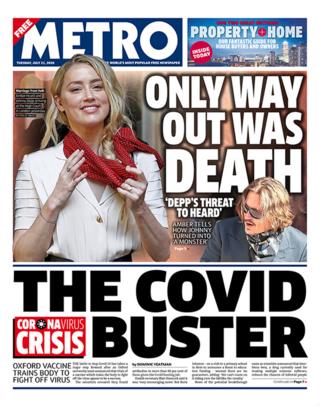


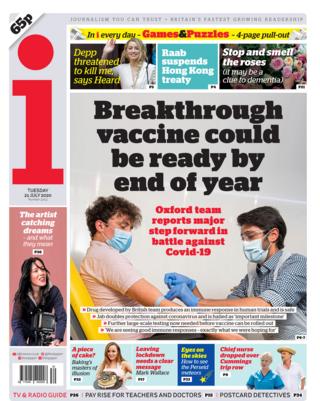
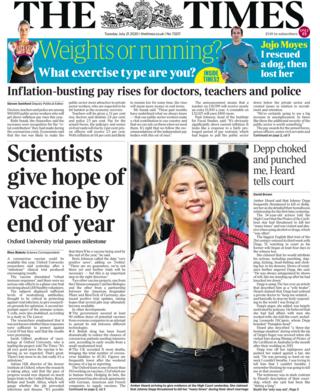
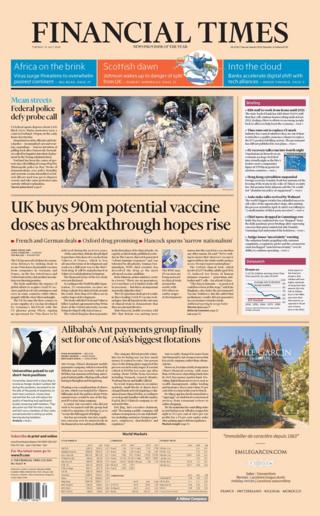
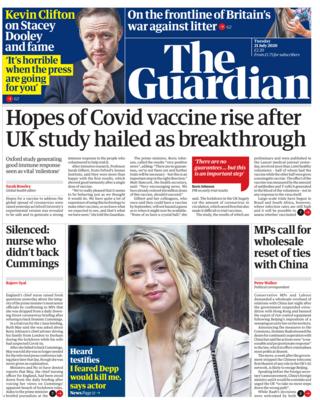
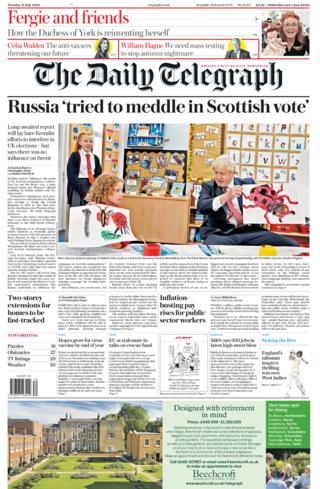
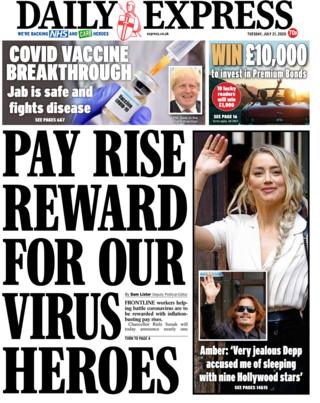

Promising results from early trials of a coronavirus vaccine developed by the University of Oxford make the front page headlines for most of Tuesday's papers.
"Vaccine for Christmas," the Daily Mail declares. The Metro describes the vaccine as "the Covid Buster". The Daily Mirror says the news will be a boost to a nation worn down by the pandemic.
For the Spectator website, it is now full steam ahead for the larger study of the Oxford vaccine. Make no mistake, it adds, a vaccine is "the only game in town".
For its main story, the Daily Telegraph says the report on alleged Russian interference in British politics will disclose that Moscow tried to "influence" the result of the Scottish independence referendum in 2014, but not the 2016 Brexit vote.
According to the paper, Parliament's Intelligence and Security Committee will describe the Kremlin's attempt to divide the United Kingdom as "the first post-Soviet interference in a Western democratic election".
Pay rise 'reward'
The Express leads on the above-inflation pay rises for 900,000 public sector workers. "Pay rise reward for our virus heroes", is the headline.
Inside, commentator Leo McKinstrey says the announcement of significant pay rises for public employees is a tangible expression of gratitude for all they have done during the coronavirus crisis. Without their selfless commitment, he writes, our civic infrastructure could have broken down and the disease spread like wildfire.
A picture of more than 400 dinghies piled high in rows at a government warehouse in Dover features in a number of papers. The Mail says many are believed to have been used by illegal migrants in crossings of the Channel.
Fibre-glass bottomed fishing boats, high-specification rigid inflatable boats and a kayak are among the abandoned fleet. The vessels give some insight into the true scale of the migrant crisis on the English Channel, the paper says.
Sign up for a morning briefing direct to your inbox
The Telegraph reports that Facebook is coming under pressure from police to remove pages publicising illegal raves. It says police are concerned that Britain is facing a summer of illegal parties as young people fed up with lockdown and unable to go to clubs or festivals attend underground events.
Ken Marsh, chairman of the Metropolitan Police Federation, tells the paper social media companies are allowing by proxy the law to be broken. The paper quotes Facebook as saying it's investigating the groups that are reported to the company.
Elsewhere, the Mail remarks that the pandemic may have changed the world, but some truths remain intact. Yesterday, yet again, it says, England were grateful for a rather different force of nature: Ben Stokes.
The all-rounder who helped England level the three-match Test series against the West Indies is feted all over the back pages, with only one headline possible for many - "Mr Incredible" - as he was described by the England captain, Joe Root.
The sound of the summer is back, the Express declares, bringing solace to sports fans across the land.
Finally, how has the pandemic changed our dress codes as millions of us work from home?
'Zoom shirt'
It is a question considered by the Guardian, which reports research suggesting only 10% of people get dressed for working from home at the start of the day - changing into comfortable clothes later.
But one item of clothing that has become essential is the so-called "Zoom shirt". According to the paper - quoting the Urban Dictionary - this is the shirt or blouse that's kept on the back of your chair to "quickly be presentable for video conferences".
It says a recent poll found that 42% of camera-ready home workers owned one.